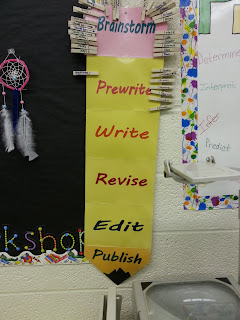One of the hardest parts of being an English teacher in the middle school is getting students to read. Doesn't sound so bad at first. Most people just say, "Well force them! They don't read they should fail." How simple that seems.
One struggle with this theory or method (which ever pleases you) is the knowledge that I have students who made it to 6th, 7th, 8th grade and cannot read. If there is one thing I can do as a teacher it is to help families who are reading this prevent this horrible situation for their child.
Let me explain the ramifications of a student making it to middle school without being able to read. These students have been passed along by the system that is meant to teach them. They have been over looked or just pushed on so the teacher didn't have to deal with behavior problems. These kids are now placed in a situation where they hate school, they do what they can to get out, and they are just fighting to keep their head above water.
If these few tips can help prevent this than I will consider this posting worth it.
Read. That seems pretty obvious doesn't it? Well for some it is more obvious than others. However, the way we read matters too. A child learns how to do things based on mimicking their parents. I have a three-year-old at home. He mimics my behavior and my husbands. It's like I have a four foot mini-me. If I am reading he'll get a book and "read." I know that he isn't reading, he is only looking at the pictures. However, this is a precursor for reading. Children first learn to read not by phonics, but by associating pictures with words.
It is also important that a child sees his parent reading. And by reading I'm not talking about on an IPad or Kindle. E-readers are great to help organize a full library and they only take up a tiny amount of space. Yet, children who play on IPads and Kindles (and like devices) don't realize that you aren't playing a game when you're on your device. You're reading a book. If you are truly against picking up a physical novel (for whatever reason) I highly recommend you read books to your child on your device. This will create a different association with the child.
Sing. I know this is about reading, but a certain song is important to your child's reading skills. The ABC's need to be heard by your child at a young age. Your child will start to memorize the song and then will be able to associate the letters, later on of course, with the song. There are also great books out there that allow for a child to sing along with the reader.
Play. Children learn through play. This includes reading skills. Many of us take our children outside to play in the snow and to climb, jump, and run. Why not play a literacy game with your child outside? Use sidewalk chalk to practice writing skills on the driveway or sidewalk. You can use flour, salt, sand, and even shaving cream to practice writing letters. You can even have your child help you with a task and ask them what items start with what letters. Check out pinterest for some great literacy games to play both indoors and out.
Ask. Ask your child questions while reading. You'll be surprised at how well they do answering your
questions. There are four different types of questions that you, as a parent, should ask your child while reading:
1. What do you think will happen next? (Predict)
2. What does [x] mean? (Clarify)
3. Can you tell me why [character] did [action]? (Question)
4. Can you tell me what happened in our story? (Summarize)
These are skills that many take for granted because we are used to doing them naturally. Yet, students are not used to this anymore. They have been taught to read quickly and move on. Not a good habit to be in! We need to teach our children to slow down as they read and think about it.
Expose. Keep your child interested in reading by exposing your child to different reading material. If you know that your child likes dogs find different books about dogs. They all don't have to be fictional, but if a dog is a main character your child will be interested.
In the same regard, make sure you involve your child in the selection of books. Giving your child a choice is a HUGE deal for him. Young children like to make choices. Passing this decision making habit onto choosing a book will help the students associate a positive action with an activity. (Seems small, but makes a huge difference.)
If a parent starts young and works through the years with their child, by the time a child reaches middle school they will be a top reader. Consistency is a key when working with children. Stay consistent and your child will grow.

.jpg)



